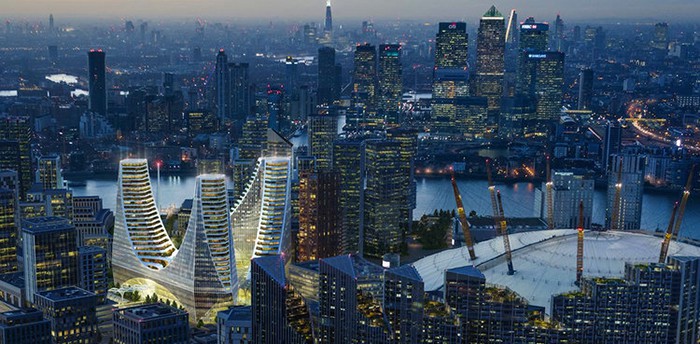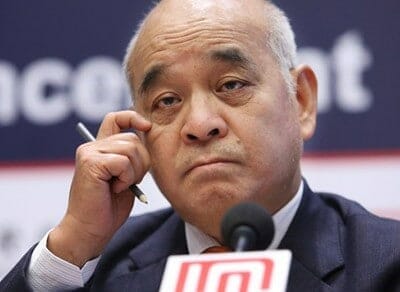
The £1 billion landmark design for Henry Cheng’s London project which is said to have been dropped
A UK non-profit organisation has announced that the £1 billion ($1.2 billion) centrepiece of a scheme to regenerate London’s Greenwich Peninsula has been dropped by the Hong Kong-based company set up seven years ago by billionaire property tycoon Henry Cheng to develop the £8.4 billion scheme.
The Greenwich Society indicated in a statement posted online that Cheng-controlled developer Knight Dragon said at a public consultation about the Peninsula Central project in May that a 113-metre tall Santiago Calatrava-designed glass complex, which was unveiled by London Mayor Sadiq Kahn two years ago to the theme to Star Wars, has been deemed too difficult to build.
Knight Dragon’s new masterplan for the 147-acre (594,888 square metre) riverside development, which is planned to deliver 15,730 homes including 3,930 affordable homes by 2035, was missing Calatrava’s futuristic, space-age design at the consultation, despite still being live on both the architect’s and the developer’s websites, according to local heritage organisation.
The announcement by the heritage group reveals a fresh setback for the Greenwich Peninsula development, which has courted controversy from the outset, after Cheng, who chairs Hong Kong’s New World Development, had earlier scaled back a promised low-cost housing element of the project, which had been a factor in the company’s winning position for the development.
The streamlined southeast London plan comes as residential property transactions in the UK were 16.5 percent lower in June this year compared with the same month in 2018, according to UK government data.
Developer Says Calatrava Towers Design Evolving
The now-seemingly scrubbed Calatrava-designed 1.4 million square foot complex, which would have featured three 30-storey towers in the shape of a three-pointed crown, was intended to be an independent community hub with flats, food and beverage venues and a theatre.
In response to inquiries from Mingtiandi, representatives of Knight Dragon did not comment specifically on whether the centrepiece towers were still part of the design. “The plans for Peninsula Central are evolving and we remain in contract and on good terms with Calatrava,” the spokesperson said. “The Masterplan, as is standard with any masterplan, shows bulk and massing only, not design, and Peninsula Central remains as shown in the 2015 Masterplan for Greenwich Peninsula.”
Earlier renderings included a wide galleria that would have led passengers from the North Greenwich London Underground station into a 152-metre long “urban forest” of bars and shops beneath a glass cupola. A futuristic-looking bridge would have connected both sides of the river, flanked by a new public park.

The masterplan of Henry Cheng’s London development is evolving
A representative of Knight Dragon said at the public consultation staged to unveil the new masterplan – hosted by both the developer and affordable housing operator London and Quadrant – that the flamboyant Calatrava design had only been a concept and that it would be replaced with something more practical like a supermarket or a post office, according to UK-based Architect’s Journal.
The representative also said that the proposed revisions to the 2015 masterplan look to upscale the regeneration to 17,487 homes, including 4,884 affordable homes.
16% Complete after 4 Years
Critics have accused Knight Dragon of ramping up prices in the development by targeting Asian property investors, with homes in the completed Upper Riverside project listed on JLL’s Hong Kong website at rates starting at £550,000.
When challenged on the issue by CNBC last month, Knight Dragon’s chief executive officer, Richard Margree, was unable to quantify how many low-cost flats costing £300,000 or less had been sold and denied that the company was dragging its feet on the development due to the stagnant property market.
In four years the developer has delivered over 2,000 homes out of a target of more than 15,730, which Margree said was in line with project milestones.
Envisioned by former prime minister Tony Blair as an area of affordable housing in a city that was becoming increasingly unaffordable for ordinary Londoners, Cheng acquired the Greenwich Peninsula development in 2012 and 2013 for a combined £686 million, on the condition that the 38 percent of the homes developed via the project would be affordable housing.
Only a year after Cheng purchased the site, the affordable housing component was reduced by 500 units, with the developer arguing that the property market had moved since the original scheme was devised in 2004.
Brexit-Challenged UK Causing Jitters
The noted change in direction comes as housing sales in the Brexit-challenged UK fell almost ten percent from May to June, according to HM Revenue and Customs.
Commercial property investment in the capital also fell to its lowest point since 2010, with transaction volume totalling £3 billion during the first half of 2019 compared with £5.65 billion for the first six months of last year.
Only last week, Singapore-based Perennial Real Estate Holdings backed out of a deal to acquire 20 percent of the City of London’s Aviva Tower, which is due to be replaced by the “Undershaft”, the Square Mile’s tallest ever building.
Perennial walked away from the £66 million transaction citing concerns over the timing of the £330 million project.
Leave a Reply